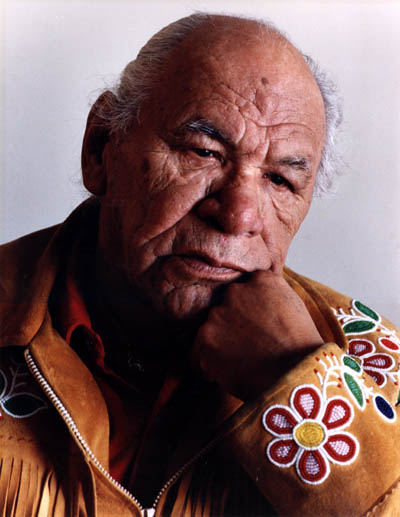|
|
Canku Ota |
|
|
(Many Paths) |
||
|
An Online Newsletter Celebrating Native America |
||
|
November 17, 2001 - Issue 49 |
||
|
|
||
|
Revered American Indian Spiritual Leader Porky White Dies |
||
|
|
|
He was born at Federal Dam, Minnesota on October
18, 1919, the youngest son of Jenny and George White. As a boy of five,
he accompanied his mother to her sugar bush stand at Sugar Point on
the Leech Lake Reservation in Minnesota. He learned the complex process
of making sugar from the sap of maple trees, and he practiced this skill
in an annual camp located at Lake Independence, Minnesota from 1976
to 2001. His wife Deb ably assisted him in these camps as did his late
camp co-director Madeline Moose of East Lake, Mille Lacs, Minnesota. His keen sense of timing and solid understanding
of the sugaring process is documented in the book Ininatig’s Gift
of Sugar, Traditional Native Sugarmaking (Lerner, 1993). (The book is
available from Amazon.) Porky won several Golden Gloves titles including
1937 Lightweight, 1938 and 1939 Junior Welterweight and the 1943 National
Championship while in the U.S. Army. He joined in 1941 and served in
the famous Tenth Mountain Division Ski troops and Engineers. Although
highly trained, he was not shipped overseas for combat duty. His abilities extended to traditional pow
wow dancing and even film roles. He sang and danced in pow wows across
the United States and in Canada. His film credits include "Roanoke,"
1986 for PBS and other video and audio productions. For many years, Porky guided hunting and fishing
parties who came to the north Minnesota woods for its rich game reserves.
His expertise, unfailing hunting eye and knowledge of the backwoods
helped spread his fame far and wide as an outstanding expert of the
outdoors. In 1975, he left for St. Paul, Minnesota and
a brand new school called the Red School House, an alternative program
for American Indian students. The multi-talented Porky taught language,
culture, instituted his famous sugar bush as well as rice, fish, and
berry camps to teach his young students the traditional life of the
Anishinabe people. From that point on, as he moved from Red School House
out into a greater teaching circle, Porky’s life was willingly
given over to his people. As word of his spiritual counseling and cultural
knowledge grew, thousands came from all over the country to learn or
gain insight. He married couples, named children and adults, and conducted
sweat lodges, funerals, and pipe ceremonies, all while continuing to
teach safe hunting, crafts, and how to prepare natural foods for preservation
and use animal hides for clothing and implements. His genius for all things connected to the
outdoors and his broad smile endeared him to all those in his proximity.
To many, he was perhaps best known for his lectures on Anishinabe life.
In a quiet and determined manner he laid out the form and substance
that has held the Anishinabe people together so strongly over the centuries
that have included wars, starvation, and violent contact with Europeans. He had struggled with the effects of diabetes
for several years. At age 82, he could look back on a full life, fully
lived. Only last Saturday, he traveled north for a day of hunting. Porky directed that he have a handcrafted
coffin when he was ready for his journey. He asked that his bed be turned
west, the direction to which he would go when his journey time came.
Friends and family were at his side. A funeral ceremony will be held at Cass Lake Veteran’s Hall on Saturday, November 17th, 2001 at 9:00 am with burial at the Battle Point Cemetery, Sugar Point, Leech Lake Reservation. |
|
|
||
|
|
||
| Canku Ota is a free Newsletter celebrating Native America, its traditions and accomplishments . We do not provide subscriber or visitor names to anyone. Some articles presented in Canku Ota may contain copyright material. We have received appropriate permissions for republishing any articles. Material appearing here is distributed without profit or monetary gain to those who have expressed an interest. This is in accordance with Title 17 U.S.C. section 107. | ||
|
Canku Ota is a copyright © 2000, 2001 of Vicki Lockard and Paul Barry. |
||
|
|
|
|
|
The "Canku Ota - A Newsletter Celebrating Native America" web site and its design is the |
||
|
Copyright © 1999, 2000, 2001 of Paul C. Barry. |
||
|
All Rights Reserved. |
||

 Walter
White, known to thousands by his Ojibwe names Gay gway da kamigishkang
(Prancing Horse) and Gahgoonse (Porky or Little Porcupine) died peacefully
on November 13, 2001.
Walter
White, known to thousands by his Ojibwe names Gay gway da kamigishkang
(Prancing Horse) and Gahgoonse (Porky or Little Porcupine) died peacefully
on November 13, 2001.